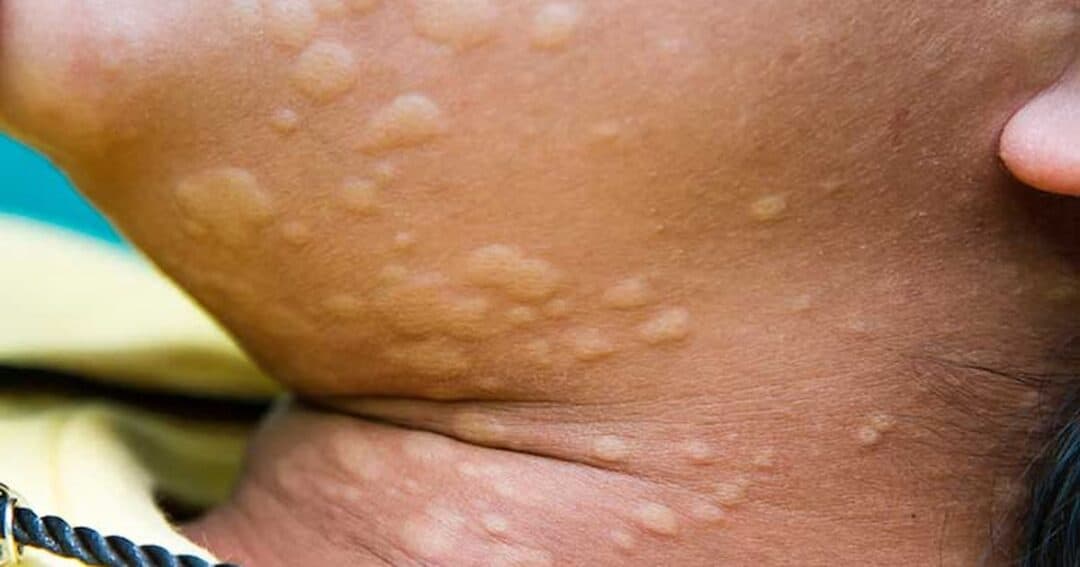Most people have had hives at least once, those itchy, red, swollen patches that appear suddenly and usually fade within a few hours or days. But when hives last for more than six weeks, they fall into a category called chronic urticaria. This condition can be frustrating, unpredictable, and sometimes misunderstood.
What is Chronic Urticaria?
Chronic urticaria (CU) is a long-lasting form of hives where red, itchy welts or swelling appear on the skin almost daily or frequently for six weeks or more. Unlike short-term hives, which often have an obvious trigger (like a food allergy or insect bite), chronic urticaria is harder to pin down and can linger for months, or even years.
What Are The Symptoms?
- Raised, red, or skin-colored welts (hives) that may change shape and location
- Intense itching, sometimes worse at night
- Swelling of the lips, eyelids, hands, or feet (angioedema)
- Flare-ups that come and go, even without a clear trigger
What Causes It?
In many cases, chronic urticaria has no clear cause. Doctors call this chronic spontaneous urticaria. But sometimes, underlying issues may play a role:
- Immune system activity: The body mistakenly releases histamine, a chemical that triggers itching and swelling.
- Infections: Some chronic infections (such as Helicobacter pylori in the stomach) may contribute.
- Other health conditions: Thyroid disease, autoimmune disorders, or hormonal shifts can sometimes be linked.
- Physical triggers: Heat, cold, pressure on the skin, exercise, or stress may worsen symptoms.
Diagnosing Chronic Urticaria
There isn’t a single test that confirms chronic urticaria. Diagnosis usually involves:
- A physical exam and review of symptoms
- Blood tests to rule out thyroid or autoimmune issues
- Allergy testing (sometimes)
- Keeping a symptom diary to track triggers
Living With Chronic Urticaria
The daily experience can be exhausting, with the constant itchiness, unpredictable flares, and worry about appearance, which may affect sleep, work, or social life. Beyond physical symptoms, many people also deal with anxiety or frustration because the condition can feel invisible to others.
Managing the Condition
While there’s no universal cure, several strategies can help:
- Avoid known triggers: If stress, certain foods, or temperature changes seem to set off hives, reducing exposure may help.
- Skin care: Use gentle, fragrance-free soaps and moisturizers. Cool compresses can soothe itching.
- Lifestyle: Wearing loose clothing, avoiding overheating, and managing stress may reduce flare-ups.
- Medical care: Doctors often recommend antihistamines to control symptoms, but treatment should be tailored to each person.
The Takeaway
Chronic urticaria is more than just a skin condition, it affects quality of life. While it can be long-lasting, it is manageable with the right support and care. If you notice hives that don’t go away after several weeks, or if swelling affects your lips or breathing, the safest step is to see a doctor. They can rule out serious causes and help you find the right management plan.
Frequently Asked Questions
1. What is chronic urticaria?
Chronic urticaria is a condition where itchy hives or swelling keep appearing almost daily or frequently for six weeks or longer.
2. What causes it?
In many cases, the exact cause is unknown (this is called chronic spontaneous urticaria). Sometimes, it may be linked to autoimmune reactions, thyroid disease, stress, infections, or physical triggers like heat, cold, or pressure on the skin.
3. Is chronic urticaria an allergy?
Not always. While allergies can cause hives, most cases of chronic urticaria are not allergic reactions. Instead, they happen when the immune system mistakenly releases histamine and other chemicals.
4. Can stress make it worse?
Yes. Stress doesn’t directly cause urticaria, but it can trigger flare-ups or make existing hives more intense.
5. How is chronic urticaria treated?
The main treatment is non-drowsy antihistamines. In more severe cases, doctors may recommend stronger medications like corticosteroids (short-term), omalizumab (an injection), or immunosuppressants.
6. Can it be cured?
There is no permanent “cure,” but most people find that the condition improves or goes away over time. Management focuses on controlling symptoms and identifying possible triggers.
7. Should I see a doctor?
Yes. If hives last longer than six weeks, or if they are accompanied by swelling in the lips, tongue, or throat (angioedema), you should seek medical attention immediately.





